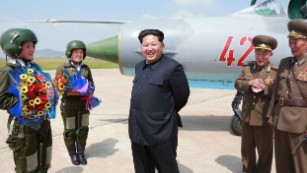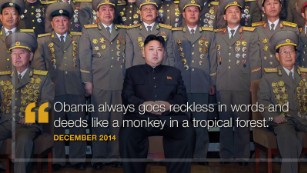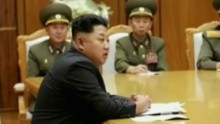North Korea issues military threat as tensions with South Korea rise
North Korea outlined an ultimatum Friday to its southern neighbor: Stop the "provocations" and "psychological warfare" or pay the price.
"If South Korea does not respond to our ultimatum," North Korean U.N. ambassador An Myong Hun told reporters, "our military counteraction will be inevitable and that counteraction will be very strong."
North Korea's regime, known for being both thin-skinned and fond of saber rattling, has made plenty of threats before. In fact, articulating derogatory and intimidating words about South Korea and the United States has been more the norm than not for years.
What makes this case different, though, is that two South Korean soldiers have been seriously wounded (by landmines August 4 in the Demilitarized Zone) and that there's been firing back-and-forth since then. An said Friday that "all the (North Korean) frontline large combined units (have) entered into a wartime state ... fully armed to launch any surprise operations and finish their preparations for action."
Specifically, this threat is tied to cross-border propaganda loudspeakers that South Korea resumed using last week for the first time in a decade. Pyongyang is demanding they be turned off by Saturday evening.
"The situation of the country is now inching closer to the brink of war," Ji Jae Ryong, North Korean ambassador to China, told journalists in Beijing on Friday.
U.S., South Korea exercises resume
South Korean Defense Minister Han Min-koo accused North Korea of pushing the tensions "to the utmost level."
"North Korea's offensive action is a despicable crime that breaks a ceasefire agreement and the non-aggression treaty between North and South," Han said Friday in an address broadcast on South Korean television.
"If North Korea continues on provoking, our military -- as we have already warned -- will respond sternly, and end the evil provocations of North Korea," he said, adding the country is working closely with the United States.

As the verbal sniping continued, the South's President, Park Geun-hye, visited troops at a base south of Seoul, receiving a briefing from military officials on the latest situation, her office said.
One ongoing point of contention is South Korea's joint military exercises with the United States -- a regular training event that An contends aims to "occupy Pyongyang."
Those exercises were suspended Thursday amid the war of words, U.S. Assistant Secretary of Defense David Shear told reporters. But they're now back on.
"We suspended part of the exercise temporarily in order to allow our side to coordinate with the ROK (Republic of Korea) side on the subject of the exchange fire across the DMZ," Shear said "And the exercise is being conducted now according to plan."
North Korea calls broadcasts 'an open act of war'
Tensions on the Korean Peninsula have been escalating since the two South Korean soldiers were wounded early this month. South Korea and the U.S.-led U.N. Command in Korea concluded North Korea planted the mines on a patrol route in the southern part of the zone.
North Korea has denied responsibility and refused South Korean demands for an apology.
"It is a bad habit (for) South Korea to groundlessly link whatever events occur in South Korea with the DPRK," An said, with the DPRK equating to his country. "They seek sinister purposes whenever they orchestrate ridiculous plots."
Seoul has since resumed its cross-border propaganda broadcasts, which North Korea called "an open act of war" and spurred it to threaten to blow up the speakers.

Kim Jong Un and North Korea's military
On Thursday, South Korean officials said the North fired artillery shells over the Demilitarized Zone that separates the two countries. A U.S. official told CNN that North Korea was believed to be targeting a loudspeaker position.
The South fired back several dozen shells of its own, according to the Defense Ministry.
No casualties were reported by either side.
Amid the tensions, South Korean officials said some residents of the area targeted by North Korea on Thursday had to be evacuated, although many have since returned.
History of disputes
It's not the first time that the two sides have briefly traded blows in recent years. They notably exchanged artillery fire over their disputed maritime border in 2010 and machine-gun fire over land in October.
But Thursday's clash was unusual because of the type of weapons used around the Demilitarized Zone, said Alison Evans, a senior analyst at IHS Country Risk.
"Cross-border attacks have mainly involved small-arms fire or, as in October 2014, anti-aircraft heavy machine guns," she said. "In contrast, there have been frequent exchanges of artillery and rocket fire across the Northern Limit Line (NLL), the de facto maritime border."
Amid the heightened tensions, North Korea's connection to the global Internet went down twice Friday, according to Dyn Research, a U.S-based private Internet-monitoring service. North Korea's Internet access last went down August 10 for 4 ½ hours, according to Dyn Research. The cause of the disruption was not immediately clear.
Is situation likely to escalate?
The question now is whether the situation will escalate further.
North Korea has used similarly alarming language in previous periods of high tension
In 2013, the country announced it had entered "a state of war" with South Korea. That situation didn't result in military action, although North Korea did temporarily shut down the two countries' joint industrial zone, which lies on its side of the border.

North Korea's verbal volleys
During that period, North Korea kept up a barrage of bombastic threats against the United States, South Korea and Japan. But at the same time, it continued accepting tourists and hosting international athletes in Pyongyang for a marathon.
South Korea said Friday that it was limiting the number of its citizens entering the joint industrial zone, but the complex was still operating. There are currently 83 South Koreans in Pyongyang attending a youth soccer event, including players and coaches, according to the South Korean Unification Ministry.
Jamie Metzl, an Asia expert for the Atlantic Council in New York, said he thought it was unlikely that the current crisis would escalate further.
"North Korea has more to gain from conflict theater than from a conflict that would quickly expose its fundamental weakness," he said, suggesting leaders in Pyongyang might be trying to "make trouble because they feel ignored by the international community and feel they have something to gain negotiating their way out of a mini-crisis."
But other analysts said the situation could still continue to deteriorate.
News Courtesy: www.cnn.com











